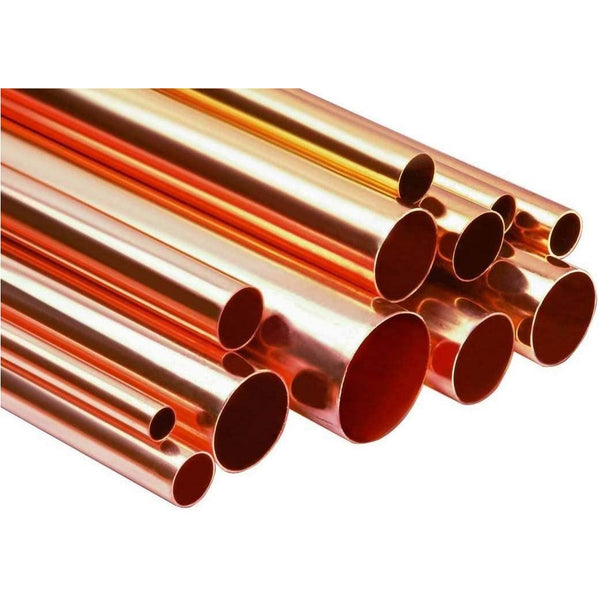Discovering the Diverse Applications of Copper Products in Modern Industries
From enhancing the effectiveness of electrical systems to playing a vital function in renewable power modern technologies, the flexibility of copper is apparent. As sectors increasingly focus on development and sustainability, the varied applications of copper warrant a closer examination, especially concerning their potential effect on future environmental methods and technical improvements.
Electric Applications of Copper
Copper is an important product in the electric market, representing around 60% of the total demand for non-ferrous steels internationally - Copper Products. Its superior electrical conductivity, which is almost twice that of light weight aluminum, makes it the favored option for a wide variety of electric applications. From electrical wiring systems in commercial and domestic structures to high-voltage power transmission lines, copper guarantees effectiveness and dependability in electricity delivery
In addition to electrical wiring, copper is indispensable to the production of electric parts such as motors, generators, and transformers. These components leverage copper's thermal conductivity and malleability, essential for warmth dissipation and effective efficiency. Copper's resistance to rust enhances the life-span and durability of electric systems, making it a cost-effective remedy in the lengthy term.
The growth of sustainable energy resources, such as solar and wind power, has further raised the need for copper in electric applications. As markets transition in the direction of sustainable power solutions, copper's function comes to be a lot more essential. Generally, the adaptability and performance qualities of copper solidify its condition as a keystone material within the electrical sector, driving development and performance across numerous applications.
Plumbing and Piping Solutions
In modern pipes systems, the choice of materials substantially impacts both performance and long life. Copper has actually become a preferred choice as a result of its distinct homes, consisting of rust resistance and antimicrobial features. These characteristics make sure that copper piping continues to be durable and secure for transporting drinkable water, an essential consideration in property and business applications.
Among the key advantages of copper in pipes is its capability to hold up against heats and pressures, making it suitable for a variety of applications, from warm water systems to home heating and cooling down networks. In addition, copper's adaptability permits less complicated installation in complex piping layouts, minimizing the threat of leaks and failings.
One more noteworthy benefit is copper's long life expectancy, commonly surpassing half a century with correct maintenance. This durability not only reduces replacement costs yet also contributes to lasting methods by decreasing waste. Copper's recyclability straightens with modern-day ecological standards, promoting a round economic climate within the plumbing industry.
Copper in Renewable Resource
The adaptability of copper prolongs past pipes applications, playing an essential role in the sustainable energy field. Its superb electrical and thermal conductivity makes it an important product in the production and circulation of renewable resource sources, specifically solar and wind power. In solar panels, copper is made use of in solar batteries and wiring, assisting in effective energy conversion and transmission. Its resistance to rust guarantees durable efficiency, which is vital for maximizing power result in time.

In addition, as the international need for electrical lorries (EVs) rises, copper's function in battery systems and charging facilities becomes a lot more substantial. The material's ability to conduct electrical power efficiently is integral to the performance of EV batteries, boosting array and charging rate.
Copper's Duty in Electronic devices
Electronic devices making depends heavily on copper's remarkable homes, particularly its high electric conductivity and thermal performance. These attributes make copper an optimal selection for a large range of electronic parts, consisting of ports, motherboard, and electrical wiring. The metal's capacity to successfully transmit electric signals makes sure minimal power loss, which is critical in high-performance digital tools.
In addition, copper's thermal conductivity plays a considerable role in warmth dissipation, shielding sensitive components from overheating. This is specifically essential in modern-day electronics, where small designs cause enhanced warmth generation. Copper is additionally preferred for its pliability and ductility, enabling it to be conveniently shaped right into elaborate designs that fulfill the demands of advanced digital applications.
With the increase of customer electronics, telecommunications, and electrical cars, the need for copper in i thought about this the electronics industry continues to expand. As developments in modern technology evolve, copper stays integral to achieving greater performance and integrity in electronic products. Its recyclability additionally improves its allure, as producers look for sustainable solutions without endangering quality. Therefore, copper continues to be a cornerstone product in the ever-expanding field of electronics.
Innovative Uses in Manufacturing

One remarkable application is in additive production, where copper-based products are utilized in 3D printing procedures. This enables the creation of lightweight components and complicated geometries, specifically in the aerospace and automobile sectors. Furthermore, copper's thermal conductivity makes it an ideal choice for warm exchangers, improving effectiveness in industrial cooling systems.
Furthermore, the increase of clever manufacturing has actually seen the consolidation of copper in IoT devices, where its conductive abilities sustain advanced noticing modern technologies. In the realm of eco-friendly power, copper is critical in the manufacturing of solar panels and wind turbines, assisting in extra efficient energy conversion and distribution.
As sectors strive for sustainability and innovation, copper's versatility and performance proceed to place it as a vital product, driving advancements in manufacturing and adding to the development of smarter, extra effective products.
Conclusion
The essential role of copper in renewable energy and its crucial feature in electronics underscore its significance in advancing lasting techniques. Jointly, these applications show copper's crucial payment to technological progress and commercial effectiveness in contemporary society.
From boosting the performance of electrical systems to playing an essential role in eco-friendly energy technologies, the versatility of copper is noticeable. As sectors increasingly focus on innovation and sustainability, the varied applications of copper require a closer examination, specifically regarding their prospective impact on future technical developments and ecological methods.
The development of sustainable energy sources, such as solar and wind power, has actually further boosted the need for copper in electrical applications. Generally, the flexibility and efficiency qualities see this of copper strengthen its status as a foundation material within the electric industry, driving technology and effectiveness across numerous applications.
The versatility of copper extends past pipes applications, playing an important duty in the renewable energy field.